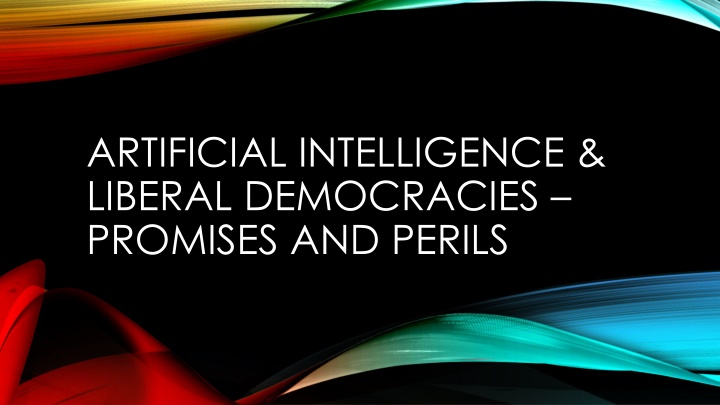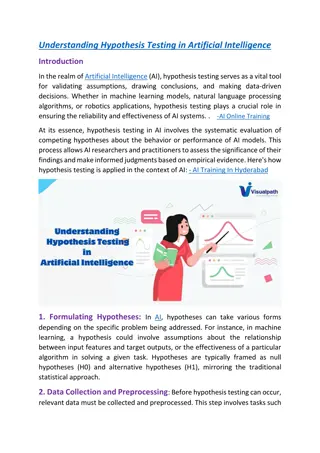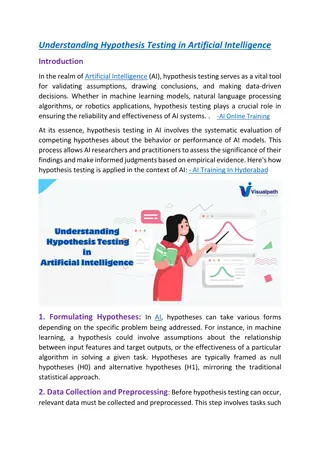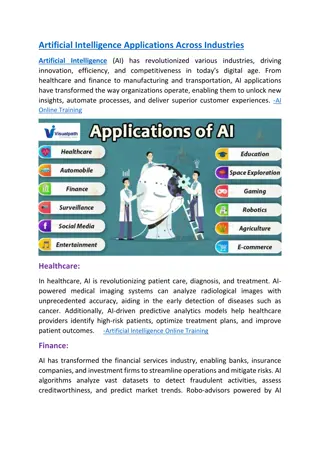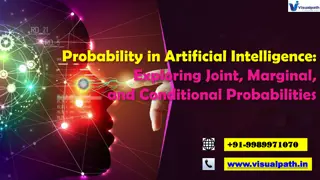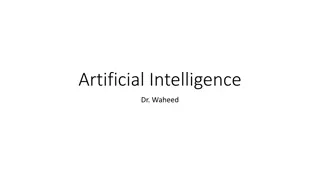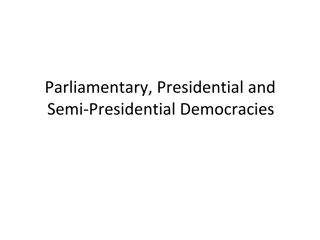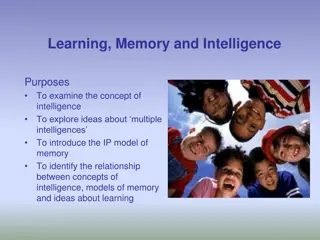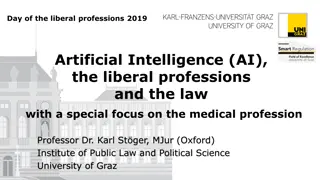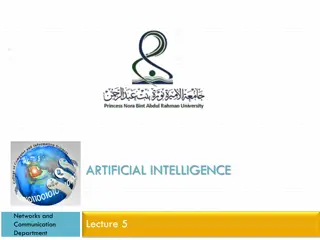Artificial Intelligence in Liberal Democracies - Promises and Perils
In the realm of liberal democracies, artificial intelligence presents both promising advancements and potential risks. This integration impacts various aspects, such as privacy, ethics, bias, and regulation across diverse fields like healthcare, law enforcement, economy, education, and more. Themes of privacy, ethics, and other critical discussions surrounding AI's impact on society and governance are explored through insightful content.
Download Presentation

Please find below an Image/Link to download the presentation.
The content on the website is provided AS IS for your information and personal use only. It may not be sold, licensed, or shared on other websites without obtaining consent from the author.If you encounter any issues during the download, it is possible that the publisher has removed the file from their server.
You are allowed to download the files provided on this website for personal or commercial use, subject to the condition that they are used lawfully. All files are the property of their respective owners.
The content on the website is provided AS IS for your information and personal use only. It may not be sold, licensed, or shared on other websites without obtaining consent from the author.
E N D
Presentation Transcript
ARTIFICIAL INTELLIGENCE & LIBERAL DEMOCRACIES PROMISES AND PERILS
IS CLASS 2 (CLASS 1 FOCUSED ON PRESENTING THE OUTLINE FOR THE COURSE, EVALUATIONS, ETC.)
LIBERAL DEMOCRACY Political System Open Society Human rights Civil liberties (free press, free speech, freedom of association) Liberalism Limited Government Individual Freedoms Rule of Law Separation of Power Can take different constitutional form: Republic, Monarchy & different regimes: Presidential, semi-presidential, parliamentary Democracy Free & Fair Elections
WHAT DO YOU KNOW ABOUT AI ? Have algorithms impacted you in the last 24h? The good The not so good ? AI & Power
WHAT IS AI Artificial = the use of computers, the automatization Intelligence = most Human behaviors: learning, perception, reasoning, using language, counting, predicting, problem solving. Using computers to mimic human decision-making & problem solving capacities Source: B.J. Copeland, Britannica Algorithms: a series of instructions given to a computer to transform data into useful information / decisions
INTEGRATIVE SEMINAR Themes Privacy Ethics Bias Regulation Fields Healthcare Law Enforcement Economy Others Education Transport Banking Sports Military Etc.
THEME: PRIVACY AI allows gathering, processing, and analyzing an amount of data that would have been unthinkable just a few years ago, including vast amount of private citizen information Private corporations accumulate loads of data on you, from your travel patterns to your biometric information Data ownership? Data protection?
THEME: ETHICS Computers are now taking on social responsibilities, helping determine who gets credit, who can be released early from prison, who committed a traffic violation, etc. How can we determine the right balance between efficiency and transparency? Can this be made safely? What happens when machines reach super-intelligence, or general-AI? Could this threaten us? If machines reach human levels of intelligence, should they gain rights and moral status? Who is responsible for machine biases and mistakes? What about if a killer- robot makes a mistake?
THEME: BIASES AI makes mistakes, but not all have the same consequences A bad Netflix recommendation Biased credit ratings Bail hearing & MachineBias Reports Algorithms are often portrayed as neutral or objective but algorithms are the product of the data they are fed (which might be biased), and the biases of their creators. Blind reverence to AI as a neutral fix-all solution to social problems risks reproducing existing biases with the imprimatur of impartiality
THEME: REGULATION (POLICY) The role of legislators? Data property? Transparency? Accountability? Legislating on GAFAMs. What to do with Privacy, Ethics, and Bias questions raised by AI.
FIELD: HEALTHCARE Many promises: quicker more precise diagnostics, fairer triage, etc. Very personal and private data Who is responsible for a deadly AI medical mistake? The doctor? The engineer who designed the AI? The hospital ownership ? Huge inequalities
FIELD: ALGORITHMIC POLICING The use of algorithms and AI to enhance and potentially transform police decision-making practices Use mass data to inform daily operations Potential benefits include increased safety of our communities, more efficient and proactive organizations, reducing police biase, accountability Potential downfal include increasing police biases, unaccountability, mass surveillance, privacy and civil rights violations The risk of biased historical police data enhancing past discriminatory practices
FIELD: ECONOMY AI as increasing the north-south gaps AI replacing work or workers? What type of jobs are being replaced? What types are being created? How to deal with Amazon? Uber?
INITIAL REFLECTION PAPER (5%) Due: By class start, 9:59AM, Friday Jan 28. Documents must be uploaded to Moodle in PDF. Task: To reflect upon your career so far as a Social Sciences student at Dawson College. Format: MLA Cover page. Times New Roman, size 12 font, double-spaced Length: 250-350 words
INITIAL REFLECTION PAPER What skills have you learned in your Social Science courses? What sort of links or overlaps have you perceived between your Social Science courses at Dawson? For example, do similar themes and issues keep coming up in different courses? Without mentioning teachers by name, from which courses have you benefited the most? You might also mention aspects you feel you learned poorly or not at all. How has your experience at Dawson as a Social Science student changed you and how you look at the world? Which of your social science courses do you think had the most effect on this change? How and why? Was it primarily the subject? The methodology? The teacher? At the end of this reflection on your social science career at Dawson, you must indicate a potential theme / field (or two) that interests you and may be explored in your project. Explain why it interests you.
IS CLASS 3 We will go more in depth on AI themes Help precise subjects. Different disciplines, and how they can be used for different subjects Give examples on Algorithmic Policing
OUTLINE What is AI ? What is Policing ? What is Algorithmic Policing? Object Recognition Software Particularities of Police AI Policy and what to avoid Democratic Algorithmic Policing Concerns Privacy Algorithmic Bias Algorithmic Policing in Canada Everyday AI Predictive Policing in Vancouver Body Worn Cameras
WHAT IS POLICING The armed arm of the State Weber s definition of the State A Police service ; force ; agency ; department ; organization ? From the use of force to the capacity to use force (Brodeur) What is force? How does AI influence this capacity - this power Police discretion and the centrality of decision making (Monjardet) The independent insular pendulum: keeping the police close, but not too close
ALGORITHMIC POLICING The use of algorithms and AI to enhance and potentially transform police decision-making practices Use mass data to inform daily operations Potential benefits include increased safety of our communities, more efficient and proactive organizations, reducing police biase, accountability Potential downfal include increasing police biases, unaccountability, mass surveillance, privacy and civil rights violations
ACTIVITY Take your phone out Search Google Quickdraw on your internet browser
OBJECT RECOGNITION SOFTWARE (1) Automatic Licence Plate Readers 10 years of AI in Canadian policing SPVM: among the firsts in Canada The industry leader: Genetec (Montreal based) Stance on China Images taken from Genetec Autovu promotional material
OBJECT RECOGNITION SOFTWARE (2) Facial Recognition in Canadian Policing Since 2014 in Calgary, Toronto, etc Despite over 4% error rates! Since 2020 in Quebec, S ret du Qu bec Mugshot database, now 0.08% error rates Winter 2020 Clearview AI scandal 48 Clients including the RCMP, TPS, VPD, etc. Social Media databases AI in policing studently becomes a scary prospect for the general public T Smith, OneZero.medium
PARTICULARITIES OF POLICING Algorithmic Policing cannot be treated as just another AI Policy field Policing as a unique government responsibility. One which enables an institution to surveil and use coercive force to restrain civil liberties AI can completely transform how our societies are policed, the invasiveness of which cannot be understated. This is fundamentally a democratic question. At its core: the power balance between citizens and their police.
ALGORITHMIC POLICING IN A DEMOCRATIC CONTEXT What are the big issues to consider ? Privacy Algorithmic Biases What forms of algorithmic policing are in use in Canada? Are governments encouraging this ? Are they regulating it ?
PRIVACY CONCERNS Traditional limits to police power Resources limitations (time, manpower, cost) Public oversight of the police AI allows gathering, processing, and analyzing an amount of data that would have been unthinkable just a few years ago, including vast amount of private citizen information Dragnet surveillance: widening the police database inclusion trigger mechanism Inexpensive, and behind screens.
ALGORITHMIC BIASES & POLICING Algorithms are the product of the data their are fed, and the biases of their creators. Facial Recognition and non-white faces AI makes mistakes, but not all have the same consequences A bad Netflix recommendation Biased credit ratings The arrest of black individuals based on faulty FRS Bail hearing & MachineBias Reports
EVERYDAY AI IN CANADIAN POLICING Ai is used everyday for clerical effectiveness Automatic transcription Scheduling ALPRs since 2009 = more officers in the streets, preventing crime and doing community policing But what about other, more controversial Police uses of AI? Facial Recognition Predictive Policing Body Worn Camera and their footage
PREDICTIVE POLICING The use of historical data to forecast where crimes are likely to occur or by whom to deter them before they happen Historical data, especially in a policing context, might be particularly biased Can lead to the continued overpolicing of marginal communities with the apparance of algorithmic impartiality
VANCOUVER POLICE 2019-202 Placed-Based Predictive Policing that impacts daily policing practices Deep learning / Machine learning. By Definition, this means even the VPD does not know what is taken into account to make predictions Adoption process with limited overseight Took preliminary (unconvincing) data as proof of concept Dealing with potential biases Only includes crime datapoints reported by citizens, but what about their biases? Re: the central park birdwatcher incident No external verification
FROM WHERE TO WHO LAPD PredPol Fiasco STOP LAPD Spying Coalition Person-Based Applications for good in Saskatchewan Missing children Privacy implications Colalboration with Universities to legitimize increased police surveillance
